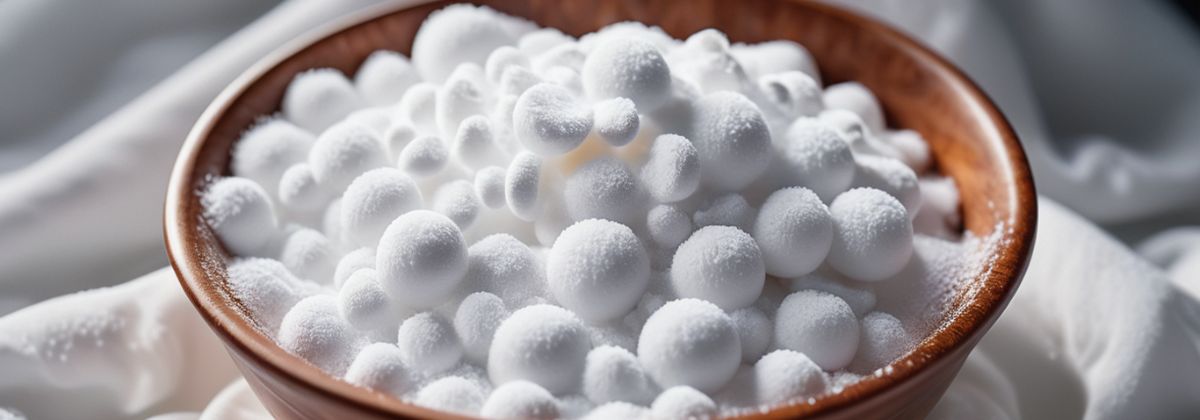31 Mar Baking Soda in Laundry: How to Brighten Your Clothes Naturally
Baking soda is a versatile household ingredient with countless uses, and one of its lesser-known applications is in laundry care. This humble pantry staple can work wonders for your clothes, offering a natural and effective way to freshen, brighten, and soften fabrics without harsh chemicals. This article will explore the benefits of using baking soda in your laundry routine and how to do it effectively.
Benefits of Using Baking Soda in Laundry
One of the most significant advantages of incorporating baking soda into your laundry routine is its exceptional ability to naturally freshen and rejuvenate your clothes. Here are some key benefits:
- Removing Odours: Baking soda is a remarkable deodoriser, effectively neutralising and eliminating unpleasant odours trapped in fabrics. Whether it’s the lingering scent of sweat, food, or mustiness, a sprinkle of baking soda can work wonders in banishing these odours, leaving your clothes fresh and clean.
- Brightening Whites: Over time, white fabrics can lose brightness and become dull due to accumulated dirt and stains. Baking soda acts as a gentle abrasive, lifting away dirt and grime to restore the vibrancy of your whites. By adding baking soda to your laundry, you can effectively brighten and revitalise your white garments, enhancing their appearance.
- Softening Fabrics: In addition to its odour-fighting and brightening properties, baking soda also helps to soften fabrics naturally. Hard water and detergent residue can leave clothes feeling stiff and rough, but baking soda can mitigate these effects. By adjusting the pH of the water, baking soda makes it more alkaline, resulting in softer and more comfortable fabrics after each wash.
How to Use Baking Soda in Laundry
Incorporating baking soda into your laundry routine is simple and straightforward. Whether you’re dealing with stubborn stains, or odours, or simply looking to freshen up your clothes, here are some effective methods for using baking soda in your laundry:
Pre-Soak Method
A pre-soak with baking soda can work wonders for heavily-soiled or odorous items. Follow these steps:
- Fill a basin or sink with water.
- Add half a cup of baking soda to the water and mix until dissolved.
- Submerge the clothes in the solution and allow them to soak for at least 30 minutes.
- After soaking, launder the clothes as usual using your preferred detergent.
Direct Addition to the Wash Cycle
Adding baking soda directly to the wash cycle is effective for regular maintenance and odour control. Here’s how:
- Start your washing machine as usual and add your laundry.
- Before starting the cycle, sprinkle half a cup of baking soda into the drum.
- Add your regular laundry detergent.
- Start the washing machine and let it run through the cycle as usual.
Homemade Laundry Detergent Recipe
For those looking to reduce their environmental impact and avoid harsh chemicals, you can create your detergent using baking soda. Follow this simple recipe:
- Mix baking soda and grated soap (such as Castile or Ivory) in equal parts.
- Add a few drops of essential oil for fragrance if desired.
- Store the mixture in an airtight container.
- Use one to two tablespoons of this homemade detergent per load of laundry, along with a sprinkle of baking soda for extra cleaning power.
Safety Precautions When Using Baking Soda in Laundry
- Fabric Compatibility: Before using baking soda on your clothes, check the care labels to ensure compatibility with the fabric. While baking soda is safe for most fabrics, it’s best to avoid using it on delicate materials such as silk or wool, as it may cause damage or discolouration.
- Test in an Inconspicuous Area: It’s important to test baking soda on a small, inconspicuous area of fabric before applying it to a larger area. This helps avoid any potential damage or discolouration to your clothes.
- Avoid Mixing with Harsh Chemicals: While baking soda is generally safe to use alongside most laundry detergents and additives, avoid mixing it with harsh chemicals such as bleach or vinegar. These combinations can produce harmful fumes or neutralise each other’s effectiveness, resulting in subpar cleaning results.
- Follow Recommended Dosages: When adding baking soda to your laundry, follow the recommended dosages to ensure optimal results. Too much baking soda may not yield better results and could leave behind a residue on your clothes.
- Rinse Thoroughly: Rinse your clothes thoroughly to remove any traces of baking soda residue after using baking soda in your laundry. Failing to rinse properly may leave a gritty texture on your clothes, which can be uncomfortable.
- Store Properly: To maintain its effectiveness, store baking soda in a cool, dry place away from moisture and direct sunlight. Proper storage will prevent clumping and ensure that your baking soda remains fresh for future use.
- Keep Out of Reach of Children and Pets: As with any household cleaning product, keep baking soda out of reach of children and pets to prevent accidental ingestion or exposure. While baking soda is non-toxic, ingesting large amounts can cause stomach upset or irritation.
Environmental Impact
- Biodegradability: One of baking soda’s most significant advantages is its biodegradability. Unlike many synthetic cleaning agents and laundry products that contain harsh chemicals and additives, baking soda breaks down naturally in the environment. After use, it degrades into harmless by-products, reducing its impact on ecosystems and waterways.
- Minimal Pollution: Baking soda is non-toxic and does not release harmful pollutants into the air or water during use. Unlike commercial laundry detergents containing phosphates, chlorine, and synthetic fragrances, baking soda is a safer alternative for human health and the environment. You can help reduce pollution and protect aquatic habitats by choosing baking soda for your needs.
- Reduced Packaging Waste: Another environmental benefit of using baking soda in laundry is reducing packaging waste. Baking soda is often available in cardboard boxes or paper bags, which are recyclable and biodegradable. By opting for baking soda over single-use plastic laundry detergent bottles, you can minimise your contribution to plastic pollution and landfill waste.
- Energy Savings: Using baking soda in your laundry can also save energy. Baking soda’s natural cleaning properties can help boost the effectiveness of your detergent, allowing you to use less hot water and shorter wash cycles. By reducing your energy consumption, you can lower your carbon footprint and conserve natural resources.
- Safe for Septic Systems: Baking soda is safe for septic systems and wastewater treatment plants. Unlike chemical-based laundry products that can disrupt the balance of beneficial bacteria in septic tanks, baking soda poses no risk of harming septic systems. By using baking soda, you can help maintain the health and functionality of your septic system.
The Last Word
Baking soda offers several environmental advantages for washing care. From its biodegradability and minimal pollution to its reduced packaging waste and energy savings, baking soda is a sustainable choice for maintaining clean, fresh-smelling clothes. By incorporating baking soda into your laundry routine, you can minimise your environmental impact while enjoying effective cleaning results.




Sorry, the comment form is closed at this time.